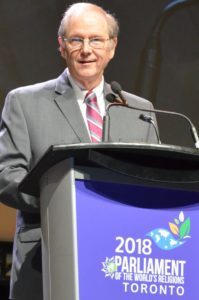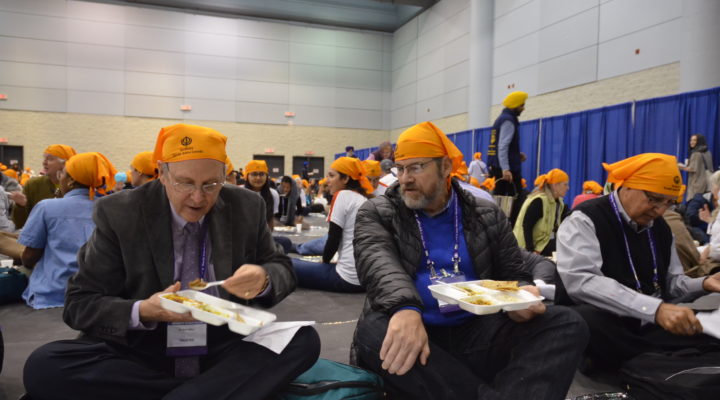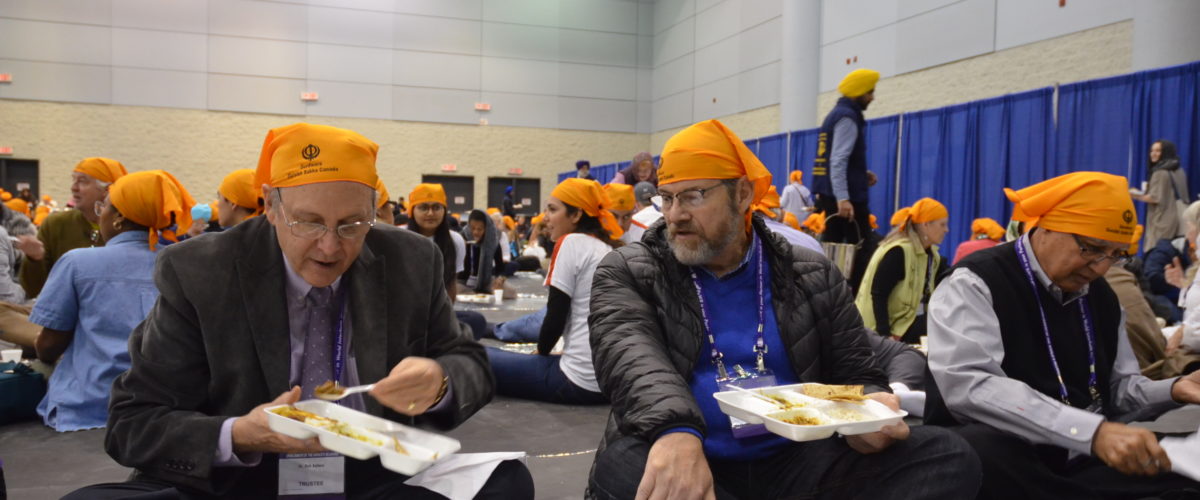Veteran Baptist scholar Robert Sellers will step down as chairman of Parliament of the World’s Religions Dec. 31 after three years of service.

Robert Sellers addresses a plenary session of the Parliament of the World’s Religions in Toronto in early November.
But that won’t keep Sellers, a member of First Baptist Church in Abilene, Texas, away from what he describes as the social and moral power of the fellowship generated when people from different religions gather and work together.
“I feel as if my new mission in life is interfaith,” said Sellers, professor of theology and missions emeritus at Hardin-Simmons University’s Logsdon Seminary.
It may be new, but that calling has been growing on Sellers for years. He attended his first Parliament meeting in 2009 and has become increasingly convinced of its effectiveness in building relationships between people of faith. He was named chairman of its board of directors in 2015.
He steps down after helping oversee the seventh convening of the Parliament, which was held earlier this month in Toronto.
Sellers said one of his goals is to convince Christians of the importance of being good neighbors to people of all faiths, not just to each other.
“I will always stay an interfaith advocate. I feel it is my new mission field.”
Sellers spoke with Baptist News Global about that ministry and the solutions it offers to global and national tensions. The following are his comments, edited for clarity.
How does the Parliament work – and is it really a parliament?
It’s best known for its convening role. There are other international interfaith organizations that have their strengths. The Parliament’s niche is its ability to convene thousands of people from around the world, including major speakers, for breakout sessions, plenary sessions, sacred art exhibits and religious music performances. But it is not a parliament as one imagines when thinking of the British parliament. This name dates back to 1893 when the original organization was called the World’s Parliament of Religions. It was a part of the Chicago exposition in 1893. The idea was that the Parliament would be a place where people would come from the East and the West to talk about important issues in the world and of their own faith. It was the first time that East and West really came together. There were interruptions due to war and other things, but in 1993 the second parliament was held, and the name just stuck.
What is its chief purpose?
To generate harmony among the world’s religions and spiritual traditions and to work through these religions to engage the institutions of education and government and religion to foster a more peaceful, just and sustainable world. It tries to do this not by creating unity among the religions, but harmony to face the issues that face the Earth and humanity. We seek collaboration, rather than consensus, on every issue.
You described the recent Toronto gathering as life-changing for thousands. Was that also true for you?
I’d have to go back to the first one my wife Janie and I attended in Melbourne (Australia) in 2009. It just blew us away with 6,500 or 7,000 in the room with the Dalai Lama and the leaders of different religious groups. I took 13 to 14 students from Logsdon to the one in Salt Lake City in 2015. Many said they would never miss another one. They said things like I never dreamed there could be this level of kindness and compassion between people so different religiously.
How is your involvement in interfaith work an expression of your Baptist faith, and how can it be likened to mission work?
Well, certainly it’s not a mission field in the sense that I am there to evangelize. I am there to be the presence of Christ and to be a Christian interested in the experience of other people of faith, and to stand side by side trying to solve some of the problems that confront us as human beings. I would like Cooperative Baptists and other Christians to see interfaith as an opportunity for learning and an opportunity for cooperation and working together. Loving your neighbor as yourself is not just about loving your Christian neighbor as yourself. Christians should be challenged to understand that.
Was the focus in Toronto at all on the U.S. treatment of refugees and on evangelical support for Donald Trump?
Most of the speakers didn’t refer specifically to the U.S. It’s a global conference. There were people from 70 countries. There were people from the Global South and from the Middle East and North America and other places. The focus wasn’t on U.S. events. But there was some talk about Trump and refugees and the caravan. It usually came up in some of the breakouts where issues of justice, refugees and the church, refugee resettlement, white supremacy, hate and violence, dismantling racism and welcoming the stranger were the focus.
What are some of the highlights from your time as Parliament chairman?
One has been working with a very diverse and experienced and fascinating board. Another has been working with people from around the country and other parts of the world and the opportunity to see grassroots organizations interested in interfaith and doing good work wherever they are.


